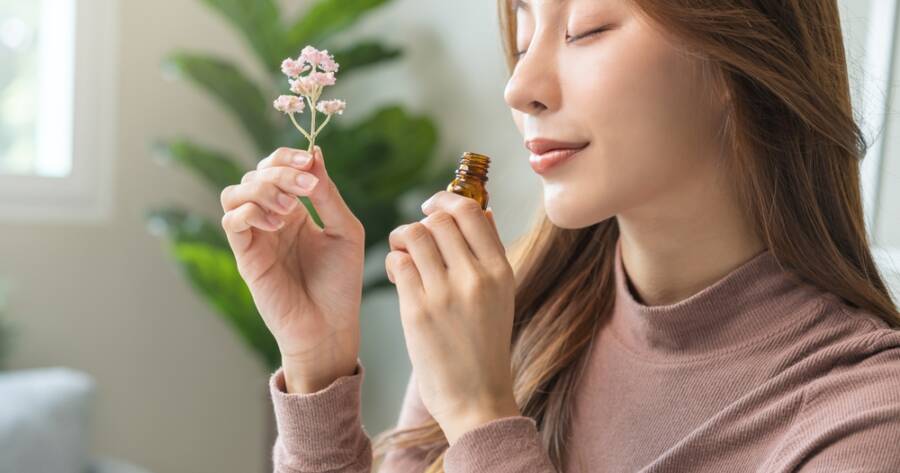Aromatherapy has gained popularity over the years as a natural way to improve both physical and mental well-being. Essential oils, extracted from plants, are used in various ways to promote relaxation, boost mood, and even enhance skin health. But how exactly do these oils work? Explore the science behind aromatherapy, uncovering how essential oils affect your skin and mood and why they have such powerful effects on your body and mind.
The Basics of Essential Oils
Essential oils are highly concentrated extracts derived from various parts of plants, such as flowers, leaves, bark, and roots. These oils capture the natural fragrance and therapeutic properties of the plant they come from. In aromatherapy, the oils are typically inhaled or applied to the skin through dilution to harness their healing properties. The most common methods include using diffusers, topical applications, or adding a few drops to a warm bath.
What makes essential oils so effective in aromatherapy is their ability to interact with the body’s sensory and chemical systems. When inhaled, the molecules in essential oils stimulate the olfactory system, which directly affects the brain’s limbic system. This part of the brain controls emotions, memory, and behavior, explaining why certain scents can instantly improve mood or trigger memories.
How Essential Oils Influence Mood
One of the most well-known benefits of aromatherapy is its ability to influence mood. Certain essential oils have calming effects, while others can energize or uplift your spirits. This is because of the way the brain processes scent. When essential oils are inhaled, the molecules travel through the nose and into the olfactory bulb, which then communicates with the limbic system.
For instance, lavender oil is widely recognized for its relaxing properties. It has been shown to reduce anxiety, promote better sleep, and lower stress levels. Similarly, oils like peppermint and citrus (e.g., lemon or orange) can have invigorating effects. They are often used to improve focus, enhance energy levels, and boost overall mood. This makes aromatherapy a powerful tool for those looking to alleviate feelings of stress or fatigue.
Additionally, essential oils can also help with more specific mood-related conditions. For example, studies have shown that oils like chamomile and sandalwood can provide relief from symptoms of depression by promoting relaxation and creating a sense of calm. Overall, aromatherapy offers a natural, non-invasive way to manage and regulate mood.
Aromatherapy’s Impact on Skin Health
While aromatherapy is widely known for its mood-boosting benefits, essential oils also have a significant impact on skin health. Many essential oils possess antiseptic, anti-inflammatory, and antioxidant properties that can improve skin appearance and address various skin concerns. When applied topically (usually diluted with a carrier oil), these oils can penetrate the skin and provide healing benefits.
For instance, tea tree oil is well-known for its ability to fight acne. Its antimicrobial properties help reduce the growth of acne-causing bacteria, while its anti-inflammatory effects soothe irritation. Similarly, lavender oil is often used to promote healing for burns, cuts, and insect bites due to its soothing nature. It also helps reduce the appearance of scars and can even prevent wrinkles by encouraging healthy skin regeneration.
In addition to treating specific skin conditions, essential oils can also enhance overall skin appearance. Oils like rose, frankincense, and geranium are commonly used in anti-aging skincare routines due to their ability to support collagen production and reduce the appearance of fine lines. For dry or dehydrated skin, oils such as argan, jojoba, and avocado oil can deeply moisturize and nourish.
Safety Considerations When Using Essential Oils
While essential oils offer many health benefits, they should be used with care. Since these oils are highly concentrated, it is important to dilute them with a carrier oil, such as coconut or olive oil, before applying them directly to the skin. Undiluted oils can cause irritation, redness, or even burns.
When using essential oils in a diffuser, make sure to follow the recommended guidelines for the amount of oil to use. Overuse can lead to headaches or dizziness, and it’s always important to ensure that the room is well-ventilated. If you have sensitive skin or are prone to allergies, it’s best to perform a patch test before using a new essential oil topically.
Pregnant women, individuals with underlying health conditions, or those with asthma should also consult a healthcare provider before using certain essential oils. Some oils may not be safe for use during pregnancy, and others may trigger respiratory issues in sensitive individuals. Always consult with a professional if you are unsure about the safety of a particular oil for your specific needs.
Combining Essential Oils for Maximum Benefits
Many people enjoy blending essential oils to enhance their therapeutic effects. By combining oils with complementary properties, you can create personalized blends that target specific goals. For example, mixing lavender with chamomile can create a calming blend perfect for relaxation and sleep, while a combination of eucalyptus and peppermint may provide relief from sinus congestion.
When blending oils, it’s important to focus on the intended effect and ensure that the oils complement each other. Some oils are known for their balancing properties, like geranium, which can help restore harmony in both the skin and mind. The art of blending essential oils allows you to tailor your aromatherapy experience to your unique preferences and needs.
Unlocking the Full Potential of Aromatherapy
Aromatherapy offers a natural and enjoyable way to improve both your mental and physical well-being. Whether you’re using essential oils to relax, boost your mood, or enhance your skin health, their powerful effects are rooted in science.
By understanding how essential oils impact your body and brain, you can make more informed choices about which oils to use and how to incorporate them into your daily routine. With the right knowledge and precautions, aromatherapy can become a valuable part of your wellness journey, allowing you to experience a deeper connection between mind and body.

